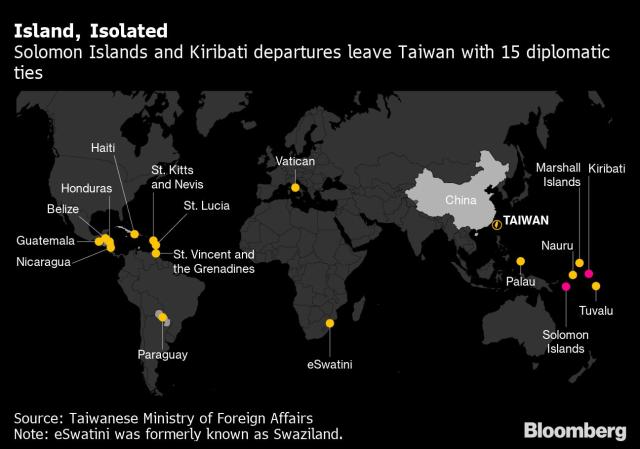(Bloomberg) -- For Taiwan, the Pacific Islands had been relatively stable as China siphoned off diplomatic partners elsewhere after independence-leaning President Tsai Ing-wen took power in 2016. That all changed this week.
On Monday, the Solomon Islands -- one of the biggest economies in the region -- recognized China and ended formal relations with Taiwan that began in 1983. Kiribati followed suit in news that broke on Friday. Before the defections, Taiwan hadn’t lost a friend in the region since 2004.
Taiwan now has just 15 diplomatic partners worldwide, including four in the Pacific. At least two of those relationships are also looking shaky, as China’s spending spree of $1.6 billion in aid and loans to the region since 2011 -- more than four times the amount Taiwan has been able to contribute -- has outmatched the democratically-run island.
“The defections show that Taiwan has hit the ceiling on how much it’s willing to pay to keep its allies in the Pacific,” said Jonathan Pryke, who researches the Pacific Islands at Sydney-based think tank the Lowy Institute. “Ultimately for these countries, it’s an economic decision, not a foreign policy one. But for China the main game here is the marginalization of Taiwan, and it also solidifies its presence in the region.”
China Claims Diplomatic Coup Over Taiwan With Solomon Switch
That footprint is a growing concern for the U.S. and its close ally Australia. Diplomats in Washington and Canberra fear that China’s end-game in the Pacific Islands may be to establish a naval base that would greatly enhance its military reach toward the Americas.
China said it “highly” appreciated and supported Kiribati’s decision, and that the move would bring “unprecedented opportunities” to the country.
“In the past few days the Solomon Islands and Kiribati, both Pacific island countries, have decided to recognize the ‘one-China’ principle, sever ties with Taiwan and resume or establish relations with China. It is further testament that the ‘one-China’ principle is the overriding trend recognized by all,” foreign ministry spokesman Geng Shuang told reporters in Beijing.
“Relations between China and Pacific island countries are enjoying rapid development,” he said.
- Taiwan cuts ties with Solomon Islands
- NZ-Japan partnerships signed on biofuels, renewable energy, AI, robotics
- China gaffe: Where in the world is Jacinda Ardern?
Luring Allies
While Beijing and U.S.-backed Taipei have competed for diplomatic recognition since 1949, the battle has intensified in recent years. Since Tsai was elected in January 2016, China has lured away a third of her 22 allies.
“China’s main goal is to squeeze Taiwan’s space in the international arena,” Taiwan Minister of Foreign Affairs Joseph Wu told a briefing on Friday. “The ultimate goal is to wipe out Taiwan’s sovereignty all together.”
El Salvador cut ties with Taipei last August, months after Burkina Faso and the Dominican Republic switched recognition to Beijing. This week’s defection of the Solomon Islands is perhaps the most important flip, as it means China has reduced Taiwan’s formal diplomatic footprint by almost half in terms of population and economic output since Tsai came to power.
China has gained an advantage in the region by funding and building much-desired transport and utility infrastructure, compared with the focus by U.S. and Australia on bolstering governance, health and education services. Australian Prime Minister Scott Morrison is expected to discuss Beijing’s growing sway in the South Pacific during face-to-face talks with President Donald Trump in Washington on Friday.
China’s Pacific Ambitions Loom Over Trump Talks With Aussie PM
The U.S. recently established a Directorate of Pacific Affairs within the White House National Security Council, which provides a hub for coordinating U.S. policy in the region with other like-minded countries, including Australia. Australia unveiled a A$2 billion ($1.4 billion) infrastructure fund for the region last last year, while the U.S. joined a group that includes Japan, the European Union and the Asian Development Bank to fund projects.
“These changes are designed to focus inter-agency and international policy on the challenges posed by China’s growing strategic footprint and influence in the South Pacific,” said Ashley Townshend, director of the foreign policy and defense program at the University of Sydney’s United States Studies Centre. “Australia and the U.S. have, until recently, been asleep at the wheel when it comes to what’s been happening in the region.”
Too Late?
Whether such tactics come too little, too late to halt China’s rising power in the region remains to be seen. Of the four remaining Pacific Islands nations that recognize Taipei, two remain particularly vulnerable to Beijing’s overtures, according to Pryke from the Lowy Institute.
“Nauru and Tuvalu are very small and have had recent leadership changes, so China could sense they are vulnerable to pressure and could be the next to flip from Taiwan,” he said. “Palau and Marshall Islands have deep, significant relationships with the U.S., and it’s hard to see them swapping even if they wanted to.”
Australia Boosts Pacific Spending as China Widens Foothold
The leaders of Palau and Marshall Islands held security talks with Secretary of State Michael Pompeo last month when he visited Micronesia, a display designed to show that the U.S. hasn’t taken its eye off the region that it forged ties with in the heat of World War II.
Taiwan said Friday it had no problem with the four other Pacific allies. But it routinely has said the same thing about other nations just before they end up recognizing China, like Solomon Islands and Kiribati this week.
“Losing two diplomatic relationships in one week is a major blow for Taiwan,” said Bates Gill, professor of Asia-Pacific security studies at Australia’s Macquarie University. “And it’s a bit of coup for Beijing, which has been working pretty hard in the last five years to cultivate the remaining countries that continue to have relationships with Taiwan. It’s a big win for Beijing and a tough loss for Taipei.”





